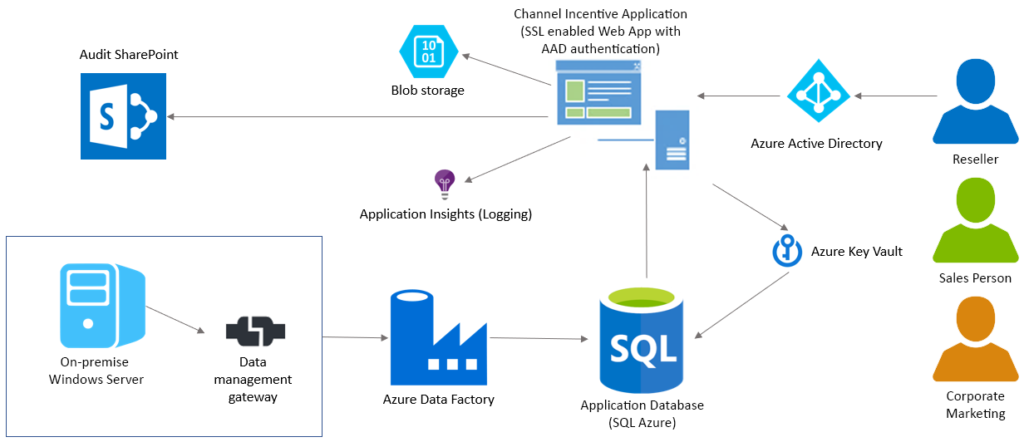Exeliq migrates distribution channel incentive to Azure Services.
Business Case:
A leading software company partners with hundreds of resellers across the globe to distribute its products. The resellers sell hundreds of thousands of units annually, generating millions of dollars in sales. The software sales managers and resellers formerly relied on a traditional Windows-based application to record and verify reseller sales and to calculate and distribute incentive payments.
Because the incentive fee tracking application was hosted on local servers, the application relied on local storage and network capacity. As a result, the application was subject to potential failures including local network outages, exceeding local storage capacity, and local database errors. The local servers also incurred fixed costs, regardless of whether resources were fully utilized.
Exeliq worked with the business partners, account managers, regional marketing managers, and auditors to develop a more robust cloud-based solution.
Key Challenges:
- Take advantage of the latest Azure services to increase developer productivity.
- Accommodate increasing database log size to prevent system failures from lack of server storage capacity.
- Prevent server and application from becoming inaccessible in case of network outage.
- Reduce server hardware and software costs incurred by on-premise systems.
Solution:
Exeliq migrated the distribution channel incentive software to Azure (an all cloud solution) with a migration downtime of only 2 hours and no accessibility change for users.
Key Highlights:
- Used Azure App Service and Azure Active Directory (AAD) to authenticate user access.
- Used Azure Data Factory to pull data from upstream databases on the local server and push to Azure SQL database.
- Used Microsoft Application Insights to track usage metrics.

Exeliq deployed the cloud-based solution using Azure App Service. The application authenticates user access through Microsoft Active Directory. Active Directory is utilized by configuring Azure out-of-the-box authentication and setting Microsoft as the current active directory.
The distribution channel incentive tool database is hosted on Azure SQL server. Azure Data Factory pulls the data from the upstream database on the on-premises server and pushes it to the Azure SQL database.
Key vault is used to store the connection string and credentials for sending automated emails and accessing SharePoint document libraries. Azure Blob storage stores backups of the old database and Proof of Execution (POE) submissions.
The cloud-based solution uses Application Insights to track usage metrics. Exeliq configured out-of-the-box event tracking and exception logging. Azure Virtual Machine (VM) is used to setup an on-premises gateway, which is used by the Azure Data Factory to pull data from the on-premises server.
Business Outcome:
Migrating the client’s distribution channel incentive tools to Azure resulted in higher availability, greater accessibility, and improved security.
Azure services guarantee over 99.9% availability. This ensures that the distribution channel incentive application and underlying Azure services are always accessible. The cloud-based solution ensures that the Azure services can be accessed from anywhere at any time without a need to first connect to the enterprise network. Additionally, Azure uses secured connections for services. Access to these services can be managed based on users, roles, or security groups. Azure Key Vault can be used for securely storing connections and credentials.
The improved application access resulted in significant cost and time savings for both the sales managers and resellers. The redundancy of the cloud-based solution meant that distribution channel incentives were easily tracked and accurately recorded. The resellers now get paid accurately and quickly. Cost-savings were also introduced because the cloud ensures optimal hardware resource utilization.
Outcome Highlights:
- Increased productivity for resellers and sales managers through faster access to the application.
- Increased reliability due to Azure services’ 99.9% availability.
- Cost savings due to resource optimization which can be scaled based on the application workload.
- Improved security with Azure Key Vault.

